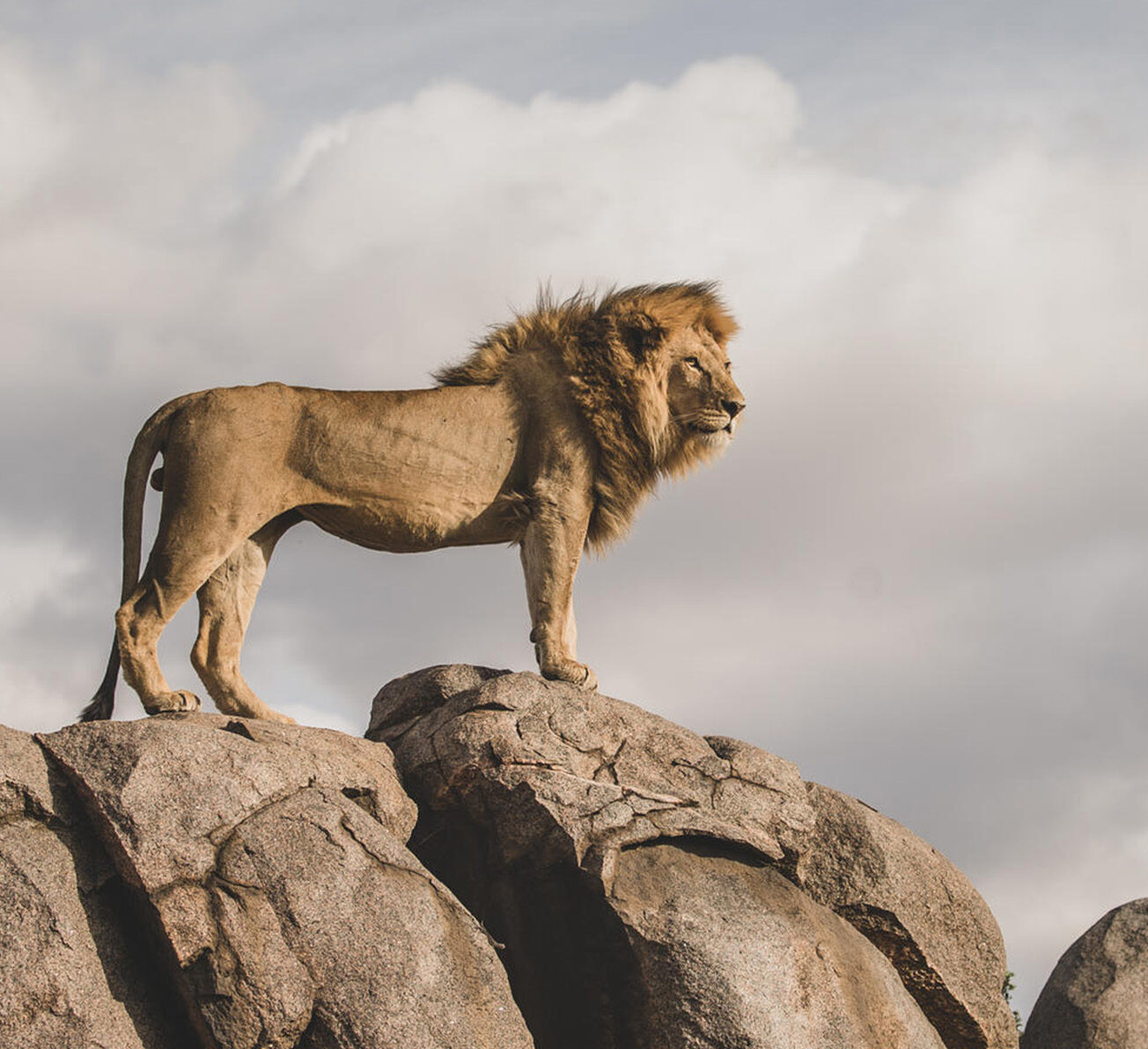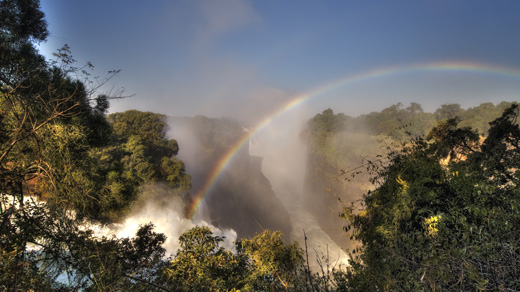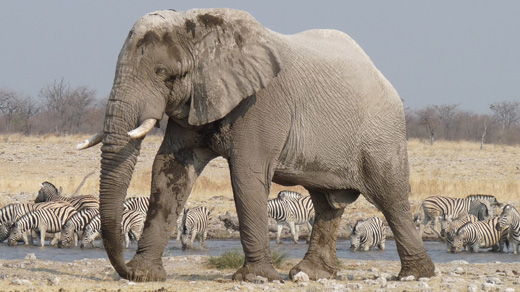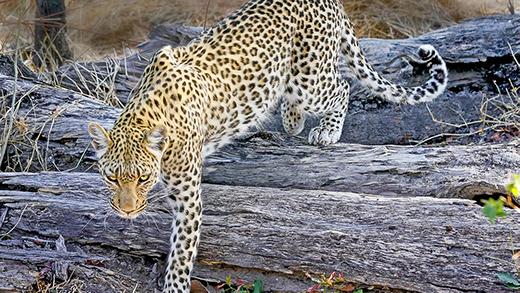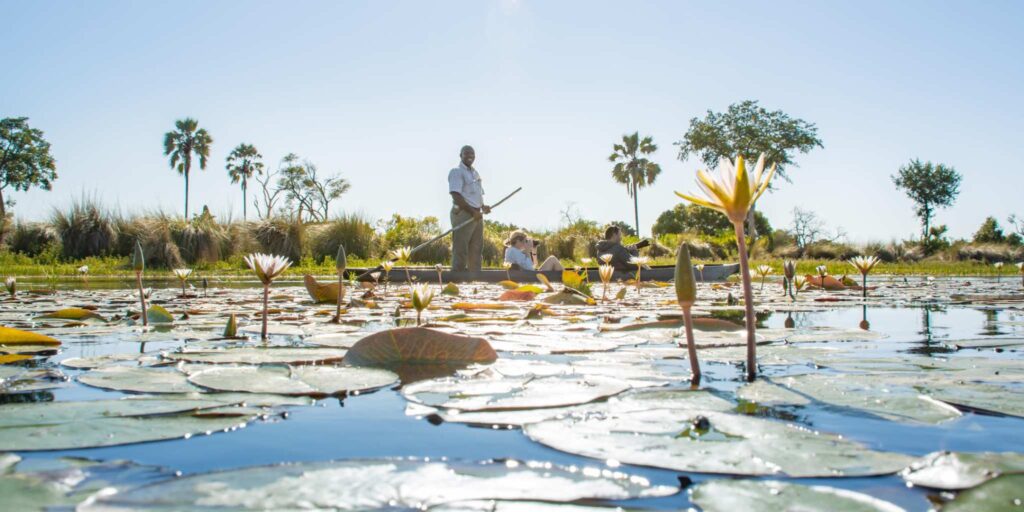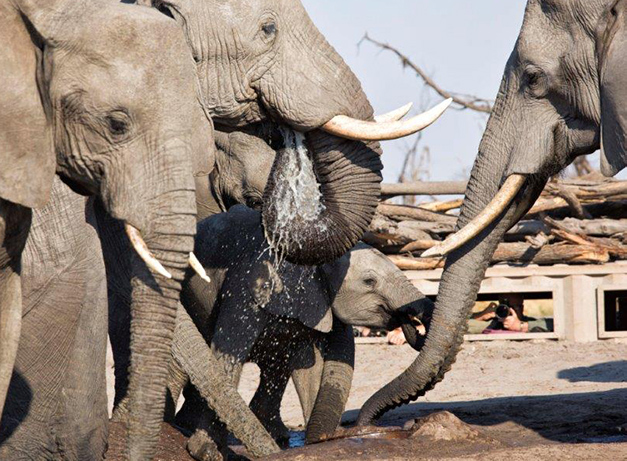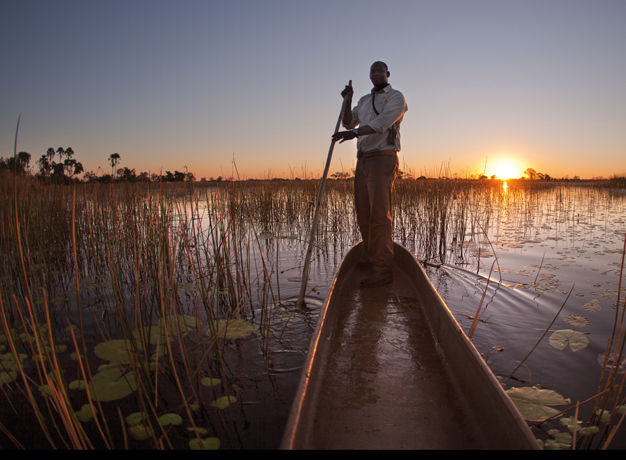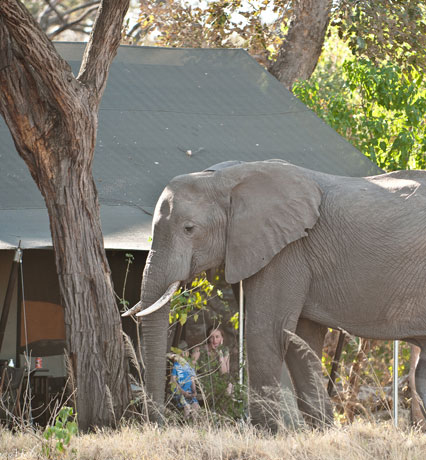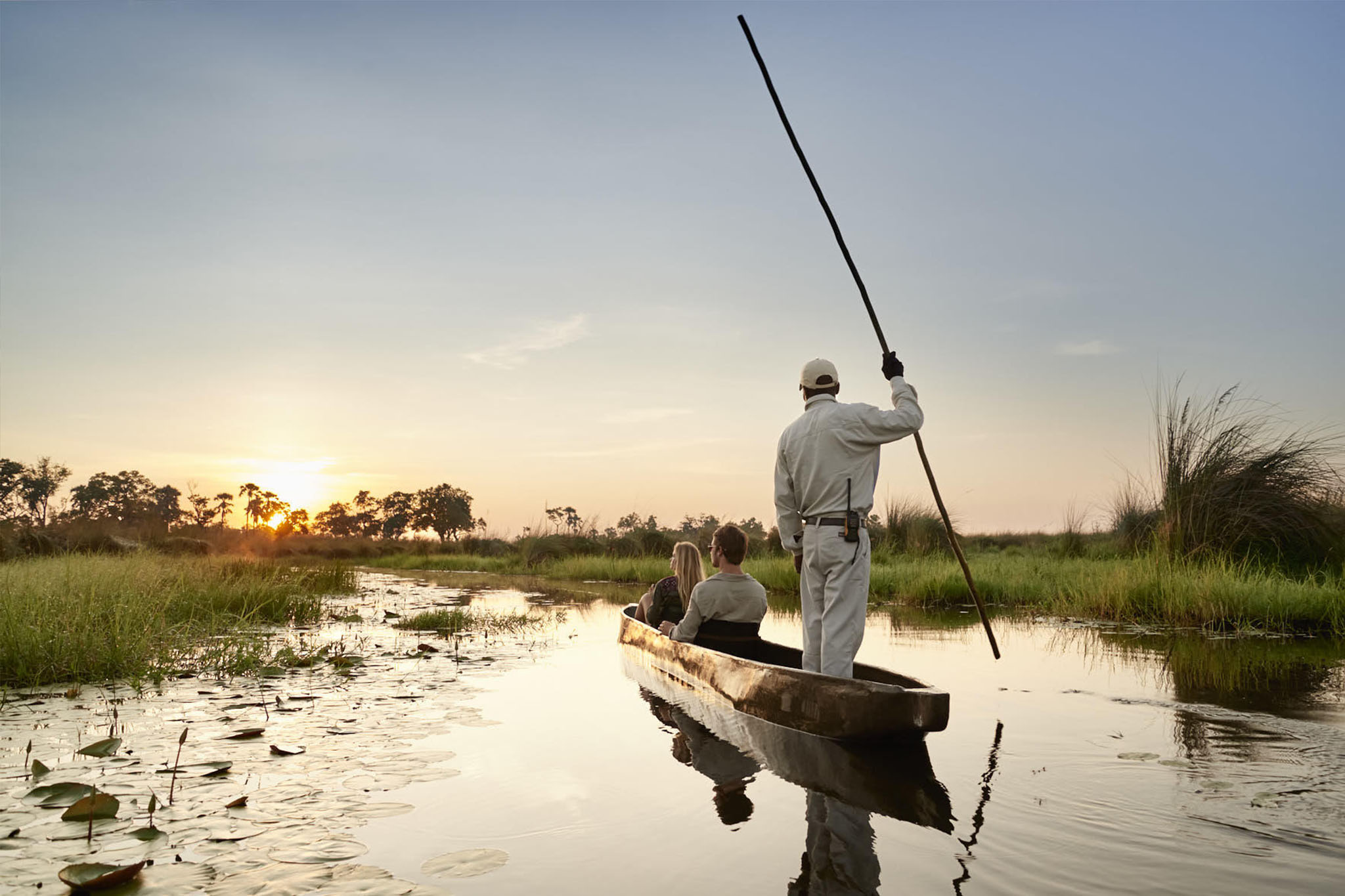
Botswana
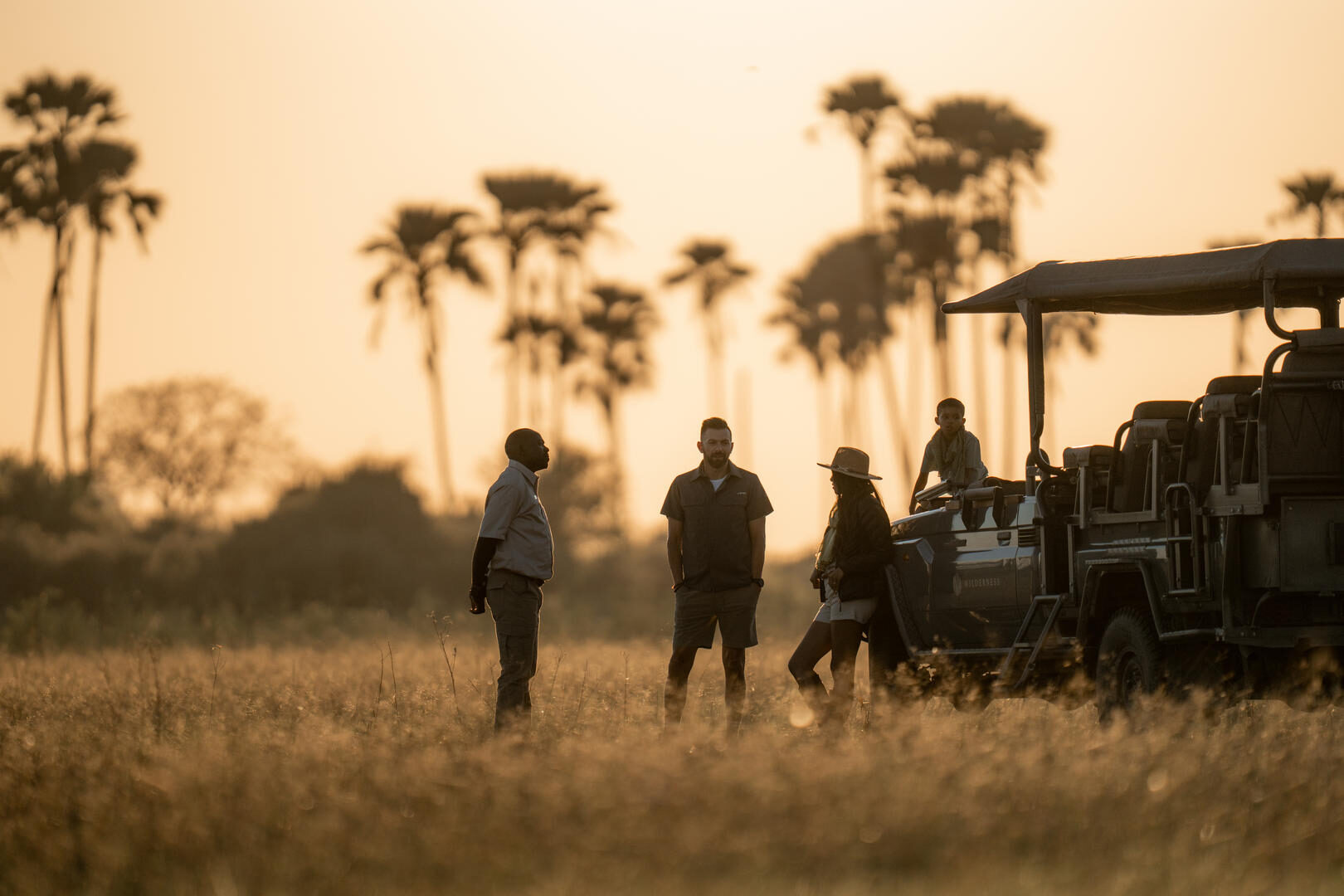
Botswana Safari Tours & Holidays
Botswana is one of Africa’s premier safari destinations, known for its vast wilderness, low-impact tourism approach, and extraordinary wildlife. From the Okavango Delta’s shifting waterways to the game-rich plains of the Linyanti and the salt pans of Makgadikgadi, the country delivers unforgettable encounters in some of the continent’s most pristine settings.
Whether you’re tracking elephants through the mopane forests or drifting silently past hippos in a mokoro, a safari in Botswana is defined by space, silence, and a deep connection to nature. Game viewing is exceptional, and the country’s commitment to conservation means fewer vehicles, fewer lodges, and a more considered experience.
Our Botswana safari tours and holidays range from fly-in adventures to private mobile camps, designed to suit the way you like to travel. Let us help you explore this remarkable country, from its iconic landscapes to its quieter corners.
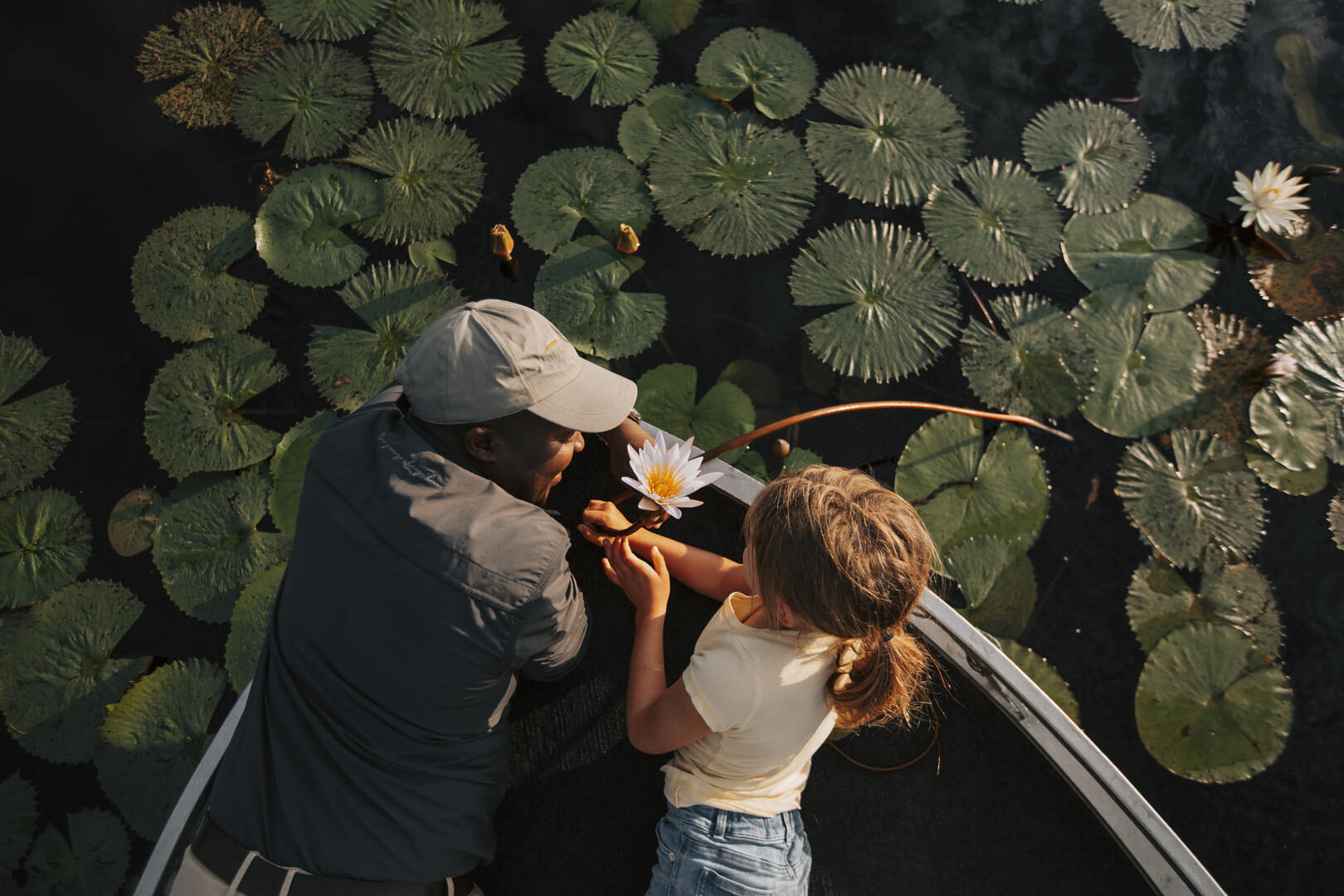
Introducing Botswana
Bordered by South Africa, Namibia, Zimbabwe and Zambia, The Republic of Botswana is blessed with a diverse scenic landscape – two of the main features being the Okavango Delta and the Kalahari Desert. Covering some 582,000 square kilometres, Botswana is scarcely populated, with national parks making up 17 per cent of the land mass. The majority of the population of 2 million is concentrated towards the eastern regions, where the capital of Gaborone is situated.
Following the arrival of European gold prospectors, Botswana became a British protectorate in 1885 under the name of Bechuanaland. Since gaining independence in 1966, Botswana has seen progressive social and economic change, as well as an increasing number of visitors thanks to its fantastic national parks and wildlife.
In Botswana, while the official language is English, the national language is Setswana, or Tswana, spoken by the majority of the population. You’ll be spending either in the local currency of Pula, or in US dollars while on safari.
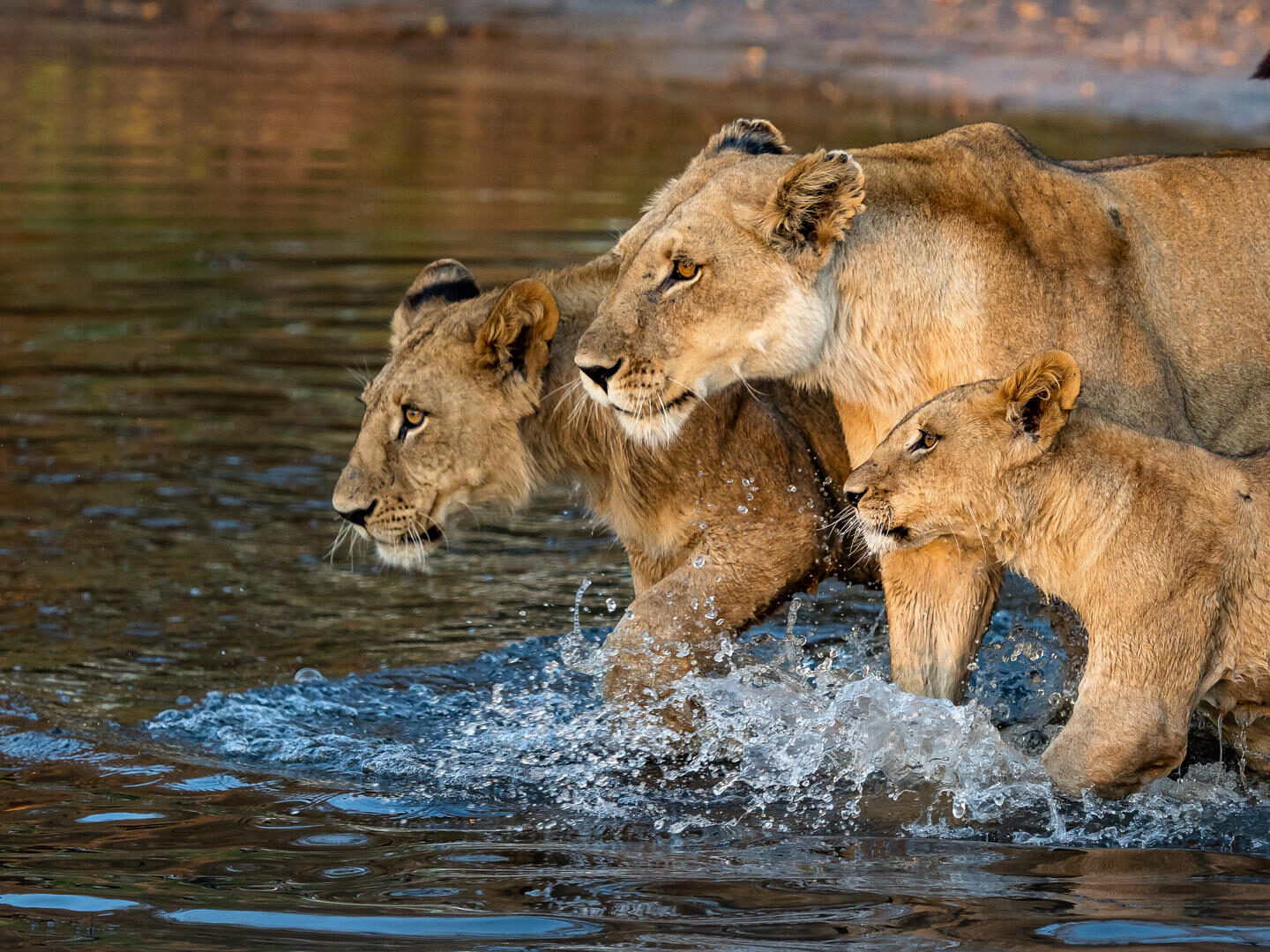
- Area 600,370 sq km
- Population 2.4 million (UN 2021)
- Capital Gaborone
- Religion Christian, Animist, Muslim
- Time Zone GMT +2
- Languages English, Setswana
- Dialing Code +267
Botswana highlights
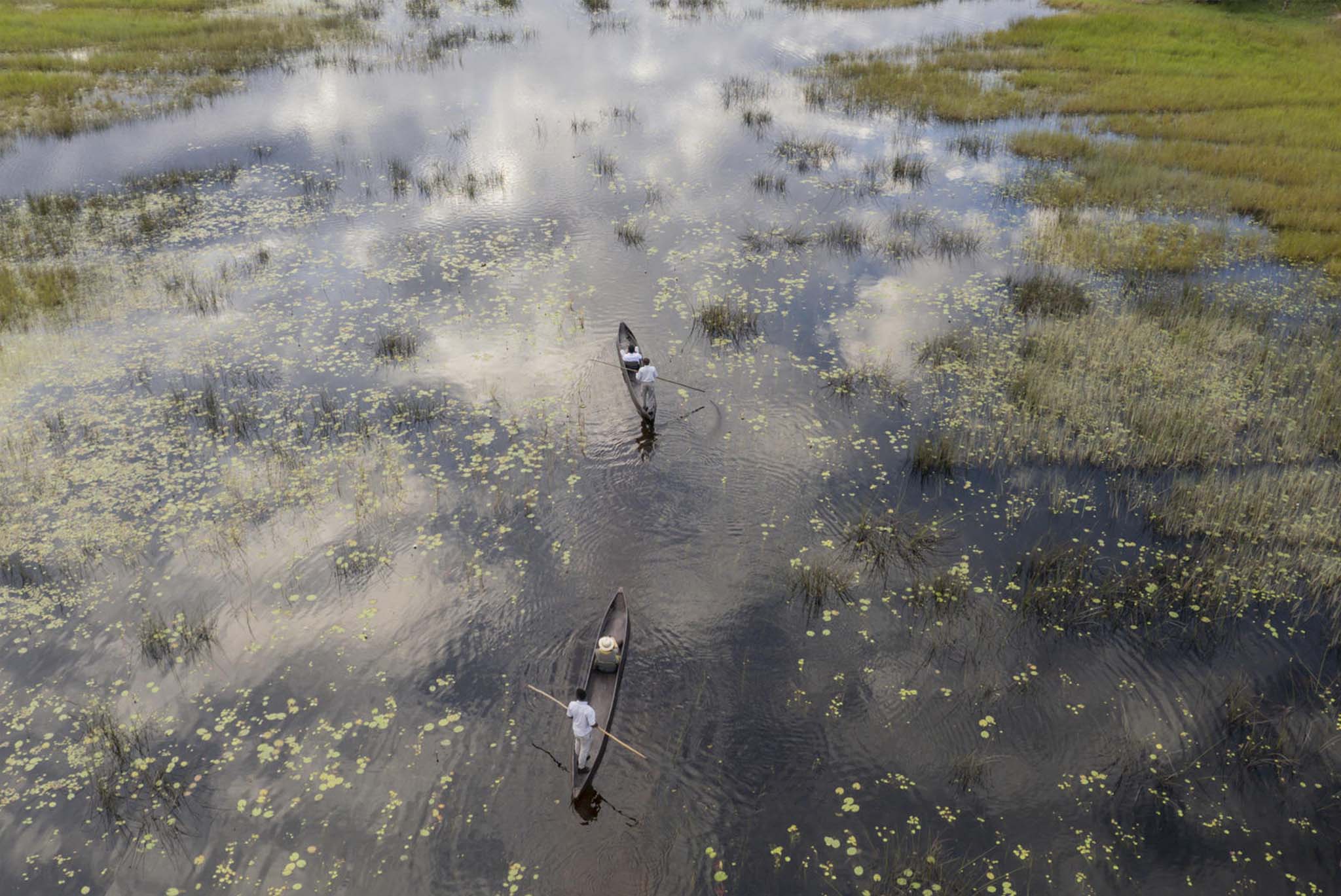
Okavango Delta
Now officially declared the 1000th World UNESCO Heritage Site.
Okavango Delta
Now officially declared the 1000th World UNESCO Heritage Site, the Delta is the largest inland delta system in the world and is a maze of lagoons and islands covering some 15,000 square kilometres. It is world renowned for its biodiversity and contrasts – a must see on any African safari. It is also home to an abundance of wildlife making it one of the most popular tourist attractions in the region.
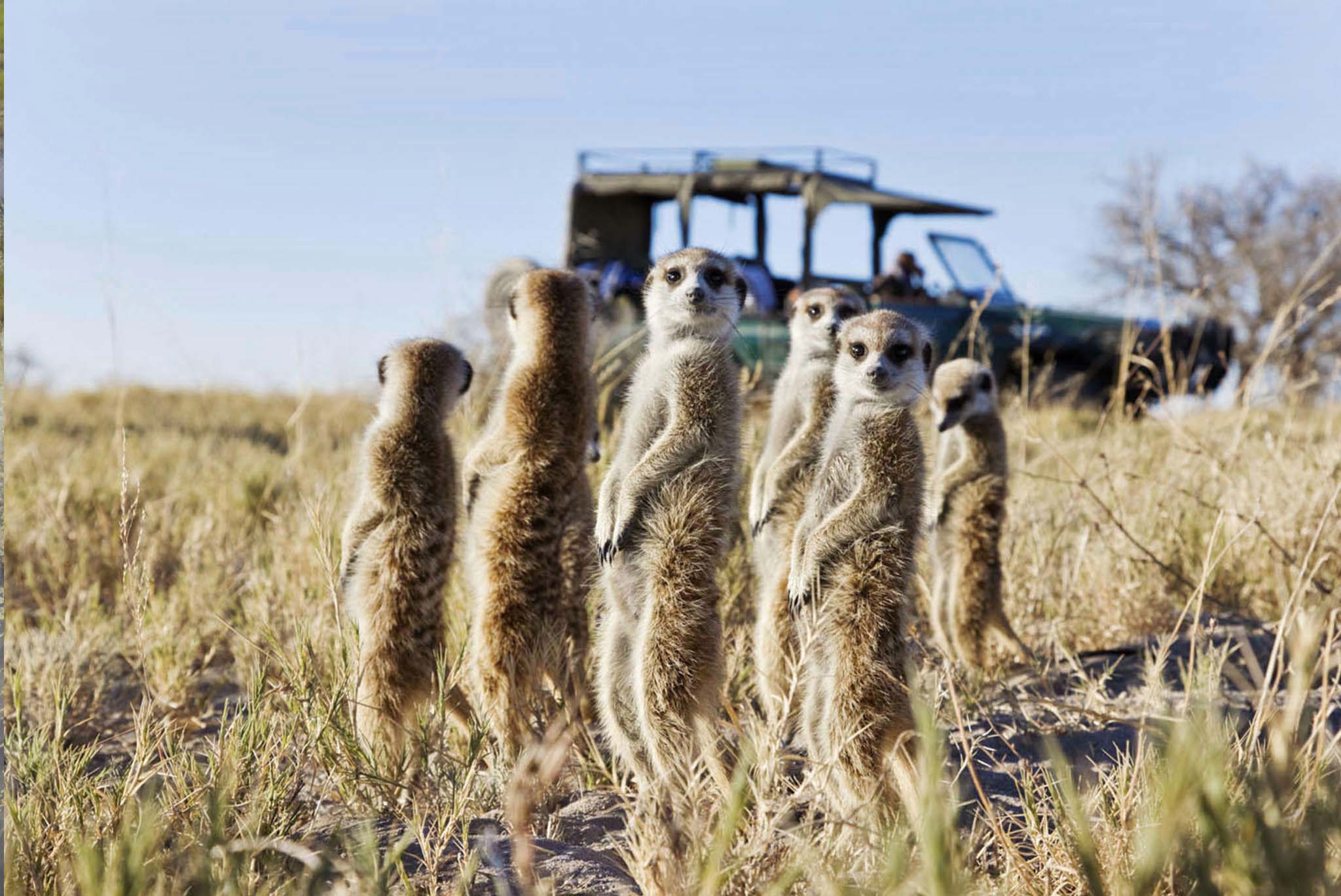
Makgadikgadi Pans
Nothing can quite prepare you for the surreal stillness of the Makgadikgadi Pans. Once a vast prehistoric lake, this is now one of the largest salt flat systems in the world, stretching over 16,000 square kilometres. In the dry season, the cracked surface reflects the sky in a way that blurs earth and air. When the rains come, water spreads across the pans, drawing flamingos, zebra, and wildebeest. But for much of the year, it is the silence and space that define this otherworldly place.
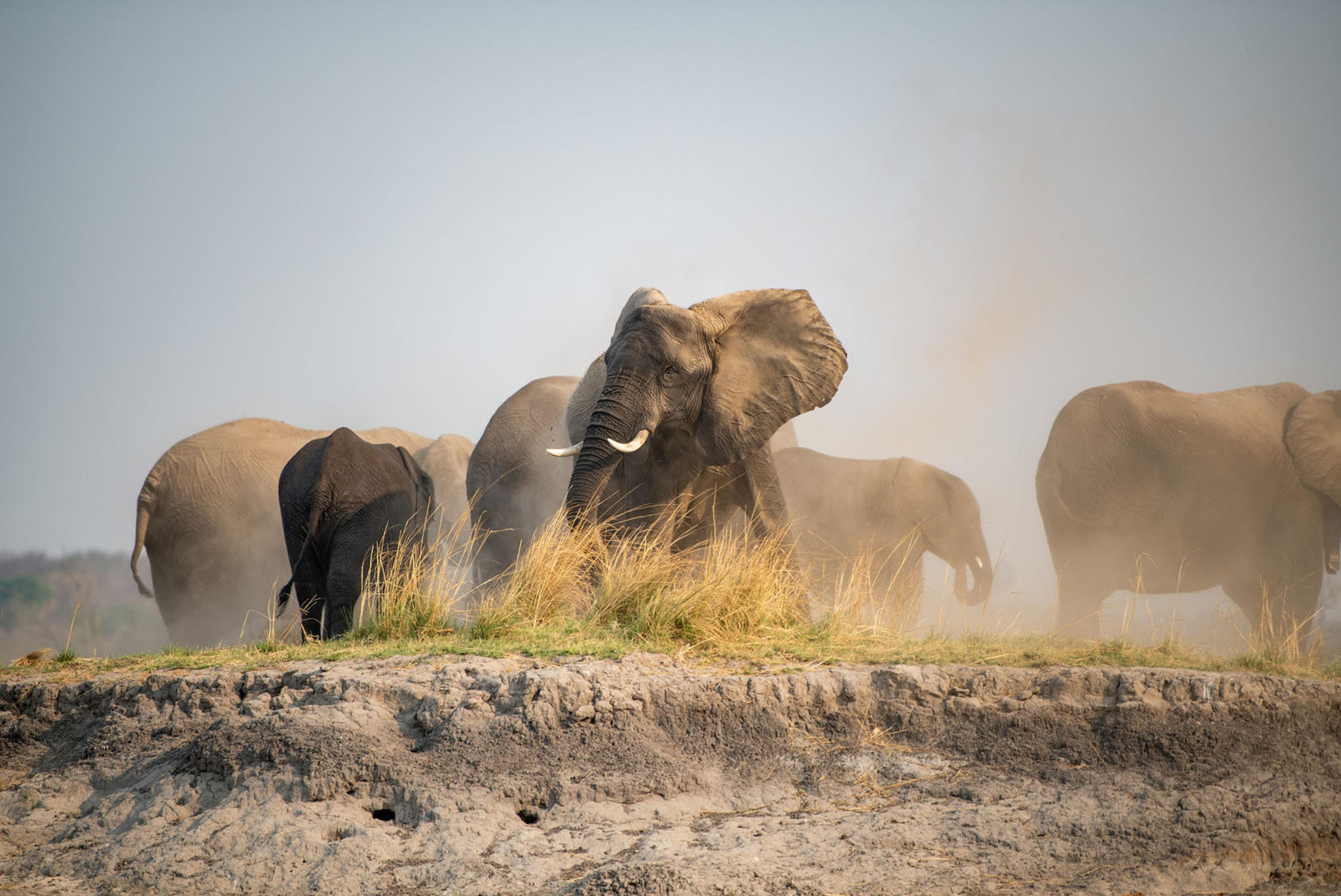
Chobe National Park
The river is the lifeblood of Chobe. Flowing through the northern corner of the park, it draws an extraordinary density of wildlife to its banks especially in the dry season when water is scarce elsewhere. Elephant herds move through in great numbers sometimes hundreds strong while hippos crowd the shallows and crocodiles lie half submerged at the edges. Spanning over 11,000 square kilometres, Chobe National Park is one of Botswana’s most diverse landscapes shifting from floodplains and mopane woodland to sandy interior forests.
Botswana experiences
Blog posts on Botswana
Essential trip information
-
Accommodation
-
Accommodations in Botswana, including lodges, safari camps, and hotels, range from reliable tourist standards to exceptional properties.
Adventure Camping
For the more intrepid travellers, adventure camping allows guests to set up their own tents and participate in basic campsite tasks. Campsites are preselected along the journey, with essentials such as two-man tents and sleeping mats provided. Facilities vary depending on the location, and in more remote areas like the Okavango Delta or Kalahari, amenities can be very basic.
Fully Serviced Camping
Mobile camps in Botswana are set up on arrival, letting guests relax and enjoy their surroundings. Tents are spacious and often include camp beds and en-suite bathrooms. Camps are staffed with chefs, waiters, and support personnel, and provide lighting, hot water, and cold drinks, while still offering an intimate connection to the wilderness.
Luxury Tented Camping
Botswana is renowned for its exclusive and luxurious tented camps, offering an unparalleled safari experience. These camps are intentionally small, typically accommodating between 6 and 12 guests, in line with government regulations designed to preserve the environment and maintain an intimate atmosphere. Guests enjoy spacious tents featuring en-suite bathrooms, comfortable beds, and private decks, allowing for a seamless blend of comfort and immersion in nature. The limited number of tents ensures personalised service and exclusive wildlife viewing opportunities, making each stay truly exceptional.
Safari Lodges
Safari Lodges vary considerably in size and architectural design but essentially these are much more permanent structures, often with many more rooms than luxury tented camps. They will often have a swimming pool and conferencing facilities. A lodge will celebrate the nature surrounding it and will usually blend in with its surrounds and built making natural, locally sourced materials.
Hotels & Boutique Hotels
Hotels in Botswana’s towns, such as Maun, Kasane, and Gaborone, vary in style and size, generally with reception areas and public facilities. Boutique hotels are smaller, stylish properties delivering a high standard of service and a more intimate experience.
Note
Accommodations may occasionally change due to circumstances beyond Bench Africa’s control. Every effort will be made to provide advance notice, but up-to-date information on any substitute property may not always be available. For details on your specific hotels, lodges, or camps, please refer to your itinerary or speak with one of our Africa experts.
-
Clothing
-
General Information
In most of Africa, formal attire is typically unnecessary; therefore, we recommend limiting your luggage to the basics. However, more formal attire may be necessary in prestigious city hotels or during luxury rail journeys, such as Rovos Rail or the Blue Train in South Africa.
On a wildlife safari, casual cotton clothing is the most practical. Opting for calm, neutral colours like tan or khaki is advisable, although a specific bush outfit is not essential. It is recommended to wear some form of sun-protective headgear, and sunglasses are essential.
To cope with colder evenings and early mornings, it’s advisable to bring a warm fleece or jacket. Additionally, a lightweight raincoat may prove useful, considering the possibility of seasonal rains. While heavy footwear is unnecessary, it’s advisable to wear sturdy, comfortable walking shoes or boots for nature walks. It’s also recommended to bring a change of shoes, like trainers, for the camp setting.
The dress code is informal at all camps but bring long-sleeved shirts and trousers for the evenings to minimise exposure to insect bites.
Many hotels, game lodges, and camps provide laundry facilities, often as a complimentary service, especially when luggage space is limited. However, if you have a busy itinerary, it is advisable to check in advance that your clothes will be ready before your departure.
Safari Packing List
Essentials:
- Soft-sided bag for easy storage in safari vehicles and light aircraft
- Hat for sun protection
- Reusable water bottle
- Good quality, preferably polarized sunglasses
- Binoculars
- Torch
- Camera, charger, and adaptor
- Travel adaptor for charging devices
- Spare glasses (if you wear contact lenses)
- Comfortable walking shoes, trainers, and sandals
- Shorts/skirts
- Long trousers/slacks
- T-shirts/long-sleeved cotton shirts for cooler evenings
- Sweater/fleece/raincoat for early morning and late afternoon game activities
- Warm jacket, beanie, gloves, and scarf for winter months
- Swimming costume
Health and Safety:
- Basic medical kit (aspirins, Elastoplast, Imodium, antiseptic cream, etc.)
- Malaria tablets and antihistamine cream
- Insect repellent containing DEET (though many lodges provide sprays)
- Protective suntan lotion, especially for pale and sensitive skin
- Tissues or ‘wet wipes’
- Lip balm
-
Communication
-
In Botswana, mobile networks are generally reliable in major towns and popular safari areas, though coverage may be limited in remote wildlife regions. Many lodges and camps offer Wi-Fi, but speeds can be slow and availability is not guaranteed. Visitors can purchase a local SIM card or use an eSIM to access cellular networks, providing a convenient option for staying connected without physically swapping SIM cards.
-
Country Overview
-
Botswana, a vast landlocked country bordered by Namibia, Zimbabwe, and Zambia, is a haven for nature enthusiasts and adventure seekers alike. Distinguished by its commitment to conservation, approximately 17% of the country is designated national park, with private concessions increasing the figure to an impressive 40%.
Gaining independence in 1966, Botswana, once among the world’s poorest nations, witnessed a transformative shift. The discovery of diamonds proved a turning point, propelling Botswana into a trajectory of continuous and remarkable growth, earning it a place among Africa’s biggest success stories.
Culturally, the nation is a tapestry of ethnic groups, with the San people contributing ancient knowledge and a unique dimension to Botswana’s cultural landscape. Botswana’s commitment to conservation is evident in its low-impact, high-value tourism approach, safeguarding thriving ecosystems and wildlife populations. This dedication extends to Chobe National Park, known for its large elephant herds, Moremi Game Reserve and the world-renowned Okavango Delta, a UNESCO World Heritage Site and one of the world’s largest inland deltas. Here, the seasonal flooding transforms the delta into a lush oasis teeming with diverse flora and fauna. Additionally, Botswana boasts the allure of the Kalahari Desert, home to unique desert adapted species and a canvas for spectacular sunsets and stargazing.
From deltas to deserts, we hope you enjoy the diverse landscapes of Botswana, where cultural richness and wildlife wonders set the scene for the safari of a lifetime!
-
Electricity
-
Voltage & Frequency
The standard voltage in Botswana is 220-240V, with a frequency of 50 Hz.
Top Tips
Generators typically supply electricity in most camps. While batteries can be recharged during the
day in camps, it is recommended to confirm with the camp manager.Socket Types in Botswana
Type D
Type G
Type M -
Families
-
Considerations when Travelling with Children
For older children and families, Botswana is exceptional. Wildlife encounters, scenic landscapes, and interactive experiences make it an exciting destination for kids who are able to join game drives and other family-friendly safari activities.
Botswana is not recommended for children under the age of 6, due to risks of malaria and the long distances between camps and lodges, which can make travel challenging for younger families. Additionally, private vehicles and guides are often needed if young children are to join game drives, adding to the cost, and some game viewing activities may not be suitable for the very young.
Accommodation
Some lodges and camps have child-friendly activities and clubs that entertain and educate young guests, making it easier for families to enjoy their safari experience. While many camps and lodges are not set up for children, a number of properties are specifically designed with families in mind, offering facilities and programmes suited to different age groups. These can include supervised wildlife activities, craft and educational sessions, and safe play areas, allowing children to engage with nature in an enjoyable and secure environment.
Allow one of our consultants to design a holiday tailored to the needs of your family, creating a balance between exciting wildlife experiences for adults and engaging activities for children.
Travelling to Botswana with Children
There are additional travel requirements for children travelling to Botswana. Please refer to the Smart Traveller website for more information.
-
Food & Drink
-
General guidelines
Most lodges and safari camps have restaurants and licensed bars, and the food offered ranges from good basic meals to gourmet style. The standard of food in lodges and camps is generally very good.
Bottled water is available in all tourist centres. It is advisable to drink at least 2-3 litres of water per day whilst on safari as dehydration can occur quickly, especially in the summer months. It is best to assume that water is NOT safe to drink unless it has been boiled. It is always wise to double check locally if in any doubt.
Wine tends to be imported and may be expensive; however, local beer and local spirits are reasonably priced and easily available as are soft drinks (Pepsi, Coca Cola etc) and bottled water.
Local Cuisine
Botswana’s cuisine is hearty, flavourful, and closely tied to the land and its traditions. Staple ingredients include maize, sorghum, millet, and a variety of locally grown vegetables. Meat plays a central role in many dishes, with beef being the most common, alongside goat, chicken, and game meats such as kudu or impala.
Traditional dishes include seswaa, a slow-cooked, shredded beef often served with pap (maize porridge) or sorghum porridge, and vetkoek, a fried dough pastry typically filled with minced meat. Fresh fish from the Okavango Delta, such as tilapia, is popular in communities near the waterways.
Many safari lodges and camps elevate these traditional flavours with contemporary touches, offering a refined dining experience that combines local ingredients with international culinary techniques. Meals are often served buffet-style or as a-la-carte in lodge restaurants, with options for those seeking lighter fare or dietary-specific requests.
-
Health
-
Health requirements can vary depending on the region you are visiting. It is strongly recommended to consult your GP or a travel health specialist for the most up-to-date advice. The following information is provided as a general guide.
Malaria: Malaria is present in many parts of Botswana, particularly in the northern regions such as the Okavango Delta and Chobe. Travellers are advised to take precautions, including the use of appropriate prophylactics, insect repellent, and protective clothing. Consult with your doctor to determine the best malaria prevention strategy for your itinerary.
-
Insurance
-
Insurance is a mandatory requirement for your travels, and we strongly advise you to secure Comprehensive Travel Insurance at the time of booking your trip.
Make sure you have a thorough understanding of the Terms and Conditions outlined in your policy and that you are well informed about your insurance coverage to ensure that you are adequately prepared for any unforeseen circumstances during your travels.
-
Internal Flights
-
Guidelines
Travellers are advised to request the local operator of the lodge or hotel to reconfirm all onward flights before departure to verify flight times. While most departure taxes, both domestic and international, are generally included in your ticket, some regional or private airports may require local payment.
General Luggage & Weight Restrictions on Light Aircraft
Light aircraft flights in Botswana have strict luggage restrictions, typically between 15 kg and 20 kg per person, including hand luggage and camera equipment. The exact allowance depends on the airline and route so it is essential to check your itinerary for the specific allowance for your journey.
Only soft-sided bags are permitted, as hard suitcases cannot fit into safari vehicles or the limited compartments on small aircraft.
On certain light aircraft, passengers may also be subject to personal weight restrictions for safety reasons. Confirming these limits at the time of booking is recommended to ensure compliance and avoid delays.
-
Local Laws
-
In a positive effort to reduce the impact on the environment, Botswana joins over 40 countries in prohibiting plastic bags. There may be implications for visitors travelling to this region, as the use, manufacture and importation of all plastic bags is now illegal.
The ban applies to carrier bags with handles and with/without gussets and flat bags without handles/gussets. If you are found carrying plastic bags on entry at the international airport that match this description (including duty free bags), these will be confiscated.
-
Money Matters
-
Currency
The official currency in Botswana is the Pula (BWP), divided into 100 Thebes (cents).
You Should Know
Full banking services are accessible in major towns, though they may involve a commission. During safaris, US Dollars are widely accepted, but ensure the notes are post-2007 to avoid issues. It is advisable to carry small-denomination cash for convenience.
Credit cards are not accepted everywhere, so it is not advisable to rely solely on credit cards as a primary source of funds, particularly in places where card usage may be limited, such as remote lodges. It is recommended to inform your bank before using your credit card overseas, and using a PIN number is considered more secure than a signature. In Africa, Visa is the most widely accepted credit card, with larger establishments also accepting American Express and MasterCard. Diners Club is not generally accepted in most establishments.
-
Photography
-
Botswana’s landscapes and wildlife provide incredible photographic opportunities, from the waterways of the Okavango Delta to the wildlife-rich plains of Chobe and Moremi. However, certain restrictions and practical considerations apply. Photographing government buildings, military sites, and border areas is prohibited. In local communities, it’s important to always ask permission before taking photos, as some people may be sensitive about being photographed. A small tip is sometimes appropriate.
Telephoto lenses, lens hoods, and UV filters are highly recommended, and dust covers are essential due to sandy conditions in some camps. Memory cards and spare batteries should be brought along, as stocks can be limited and expensive in remote lodges. While many camps provide power for charging, it may be limited to certain times of the day or rely on solar or generator power.
Drone use in Botswana is restricted, particularly in national parks and wildlife areas, and generally requires a permit. Guests are strongly advised not to bring or operate drones during their travels with Bench Africa unless they have obtained the appropriate permissions in advance.
See our 7 Handy Tips for Taking Mesmerising Photographs for tips on nature and wildlife photography.
-
Recommended Reading
-
- City of the Kalahari by Mark and Delia Owens
- The Lost World of the Kalahari by Laurens van der Post
- Lonely Planet Botswana & Namibia
- 101 Things to Know When you go on Safari in Africa by Patrick Brakspear
- Whatever You Do, Don’t Run by Peter Allison
- The Bushmen – A Changing Way of Life by Anthony Bannister
- Place of Reeds by Caitlin Davies
-
Responsible Giving
-
As you prepare for your journey to Africa, consider making a positive impact on local communities by allocating a small space in your luggage for essential items that can significantly improve the lives of those in need.
Explore the Pack for a Purpose initiative, connecting travellers with specific requirements identified by local projects. This platform provides you with a list of requested items and guidelines for responsible giving.
Additionally, many camps actively engage in community projects, often sharing details on their websites. Take a moment to visit the websites of the camps you’ll be staying at. Check if they have specific needs for supplies that you can bring and donate upon your arrival. A small act of generosity can make a significant difference.
-
Road Travel
-
Road Conditions
Please note that road surfaces vary from tarmac, gravel, sand and occasionally vehicles may travel “off road”. Additionally, when exploring remote areas, National Parks, and Reserves, expect rough and bumpy roads, occasionally in poor condition and susceptible to adverse weather conditions.
Road Safety
Established in 1969, Bench Africa has decades of experience in planning safaris with safety as a priority. We recommend travelling with a reputable ground operator that follows strict speed and road safety guidelines. Booking through Bench Africa ensures you are in capable hands throughout your journey.
-
Safety and Security
-
General Safety
- Doors should be locked when driving after dark.
- Don’t walk alone at night in city streets, isolated beaches or remote areas.
- Travellers should not display unnecessary signs of wealth (e.g. mobile phones, money, and expensive jewellery) on the streets.
- Leave all your valuables including passports locked in the room safe where available.
Safety on Safari
When staying at safari camps and lodges, they will often give you a safety briefing and there are several key points to keep in mind regarding wildlife respect and safety:
- Wild animals in Africa are not like those found in theme parks; they are not tame.
- Camps are often unfenced, allowing wild animals to roam freely. While attacks are extremely rare, it is crucial to strictly follow camp guidelines to ensure your safety.
- Pay close attention to the camp staff and guides.
- Avoid wandering off on your own without a guide, even within the camp. Once you retire to your room at night, it is important that you do not leave.
- Observe animals silently, minimising disturbance to their natural activities. Loud talking on game drives can frighten the animals away.
- Never attempt to attract an animal’s attention. Avoid imitating animal sounds, clapping your hands, pounding the vehicle, or throwing objects.
- Respect your driver/guide’s judgement regarding proximity to lions, cheetahs, and leopards. Avoid insisting on getting the vehicle closer for a better photograph, as it can disrupt a hunt or cause animals to abandon a hard-earned meal.
- Dispose of litter properly, as litter on the ground can harm or poison animals and birds.
- Never attempt to feed or approach any wild animal on foot, particularly near lodges or in campsites where animals may have become accustomed to human visitors.
- Refrain from smoking on game drives, as the dry African bush is highly flammable, and a flash fire can pose a threat to animals and their habitat.
Booking Local Activities
Booking activities locally can sometimes carry risks, as not all operators are officially licensed or regulated. Using unlicensed operators may compromise safety standards, and in the event of an incident, clients may not be covered by insurance. For peace of mind, we strongly recommend booking activities through reputable, licensed providers in advance or via your lodge or camp, ensuring that all excursions meet proper safety and legal requirements.
-
Shopping
-
There is a wealth of beautiful souvenirs and crafts available for purchase. Look out for vibrant materials, sisal bags, wood or stone carvings, unique artwork, handcrafted jewellery, woven goods, and appealing basketry. Bargaining is a customary practice at markets and roadside stalls but not typically in shops. Locals may initially quote inflated “tourist prices,” and negotiations are expected until a fair value is reached.
Cash in the local currency is widely accepted, as well as US Dollars, while credit cards may only be suitable for larger shops.
Bench Africa is committed to actively supporting anti-poaching initiatives. As part of our dedication to responsible tourism, we emphasise ethical practices and discourage the purchase of items associated with illegal wildlife trade, such as ivory, rhino horn, animal furs/hides, and other prohibited materials. Our commitment aligns with the ban on hunting and the protection of wildlife, reinforcing our stance against activities that harm or exploit endangered species.
-
Tipping
-
Tipping Guidelines
Tipping is customary in Botswana, though not as widespread as in the United States or Europe. It is discretionary, a way of expressing gratitude for exceptional service.
To assist with budgeting, the following guidelines are provided in US Dollars:
Driver (per person per full day): $5.00
Guide (per person per full day): $10.00
Camp Staff (per person per full day): $5.00
Hotel Porters (per bag): $1.00 -
Useful Numbers
-
High Commission of the Republic of Botswana
130 Denison Street, Deakin, ACT 2600, Australia
Tel: +61 2 6234 7500Australian Embassy (South Africa)
292 Orient Street, Arcadia, Pretoria, South Africa
Tel: +27 12 423 6000Australian Consulate in Gaborone, Botswana
The post is headed by an Honorary Consul Australian Consulate
Plot 16C1, Mmokolodi 1, Gaborone, Botswana
Tel: +267 776 00002 WhatsApp: +267 76909454 -
Visa Information
-
Do I Need a Visa to Travel to Botswana?
We do not provide advice on specific visas as regulations are subject to change and can vary from person to person. Please refer to Smart Traveller for the most up-to-date information. We advise checking visa requirements at the time of booking and again before travelling to keep abreast of any changes that may have occurred.
Visa requirements vary between countries, and it is essential that you acquire the appropriate visa for your journey and ascertain whether it can be applied for in advance or on arrival, in which case you will need the exact physical money. Often, your passport must be valid for at least six months beyond your intended stay, with a minimum of two blank pages (a double page). You will be required to have onward travel documents and sufficient funds. It is advisable to carry photocopies of all important documents.
It is your personal responsibility to confirm that your passport is valid, contains the necessary visa, and that you have all required travel documents.
Travelling to Botswana with Children
There are additional requirements for children travelling to Botswana. Please refer to the Smart Traveller website for more information.
You Should Know
- Visitors must be in possession of onward travel documents and have sufficient funds for the duration of their stay.
- Your passport must be valid at least six months beyond the intended stay.
- A minimum of two blank pages in your passport is required, over a double page. If there is insufficient space in your passport, entry could be denied.
Please double check entry requirements on the Smart Traveller website as this may change at any time.
-
When to Travel
-
Climate
Botswana’s semi-arid climate is characterised by hot, dry conditions, with a distinct rainy season from November to March. Rainfall is irregular, unpredictable, and regionally varied, often resulting in localised downpours while nearby areas receive none. The showers are frequently followed by intense sunshine, leading to substantial evaporation and transpiration.
Green Season: January to April
This is the time of the year when the majority of the rainfall occurs. This however does not mean that it is unpleasant. The rains usually only last a couple of hours so it doesn’t impact the whole day.
Benefits to visiting Botswana in the green season:
- This is a great time for photographers and birders to travel.
- The landscape is lush and the birdlife is fantastic at this time of year.
- If you love seeing baby warthogs, tiny zebra and infant impala, this is the perfect time of year to go!
- Safari camps offer discounts of up to 40% of what they would usually charge.
- You can expect more exclusive safaris as there are fewer visitors.
- In the green season the desert areas springs to life with a variety of flora and fauna; vast numbers of animals migrate through the desert areas of Nxai Pan, Central Kalahari and Makgadikgadi.
Downsides of visiting Botswana in the green season:
- Wildlife is more spread out; as there are more sources of water meaning that game viewing is not as fruitful at this time of the year.
- During the rains there may be flooding so logistics tend to be a bit more flexible to accommodate this.
- Insects are more abundant in the green season, in Botswana.
Shoulder Season: May and June
This is a time when the weather is less predictable, transitioning from warm and wet to cool and dry. The animals begin their migration back to the Okavango Delta and Linyati, where there are permanent water sources.
Benefits to visiting Botswana in the shoulder season:
- If it has been a dry year then game viewing can be as fruitful as it is in the dry season but prices are lower than they would be in the dry season.
- There are still a lot of baby animals around at this time of year.
- To make the most of your safari we would recommend that you consider incorporating a desert area, such as the Kalahari (LINK), as well as a visit to one of the permanent water sources, such as the Okavango (LINK).
Downsides of visiting Botswana in the shoulder season:
- If it’s been a wet year then the animals may not have migrated back to the permanent water sources so wildlife viewings may be scarcer than in the dry season.
Dry Season: July to September
These winter months are the cool and dry months of the year. The Delta and Linyati begins to flood and game has migrated towards these areas, which makes for optimum game viewing here. This is often seen as the ideal time to visit Botswana!
Benefits to visiting Botswana in the dry season:
- This is the season where there is a wide range of safari activities available, as the waters are high enough to allow for water-based activities such as mokoro excursions.
- In the desert areas it is dry enough to allow for quad biking.
Downsides of visiting Botswana in the dry season:
- As it is peak season this is the most expensive time to visit Botswana.
- The migratory game in the desert areas of Nxai Pan, Central Kalahari and Makgadikgadi have departed so the game viewing here is not as productive.
Shoulder Season: October to December
This is a second shoulder season in Botswana, a time when conditions are less predictable, transitioning from cool and dry to warm and wet.
Benefits to visiting Botswana in the shoulder season:
- Game viewing in the Delta and Linyati is as fruitful as in the dryer months.
- The prices are lower than in the dry season.
Downsides of visiting Botswana in the shoulder season:
- October and November are very hot months.
- Many lodges are closed in December.
- The weather is changeable and unpredictable.
Budget Conscious?
For the budget conscious May and June are good months to travel. There are no rains, the spray from Victoria Falls is spectacular (if you’re planning to end your safari there) and the temperature is pleasant. This offers mid-season prices so it is good value for money.
Bench Africa on Instagram
